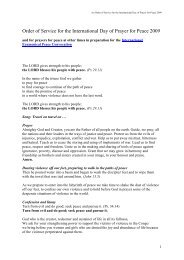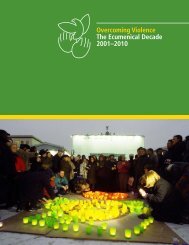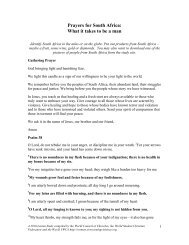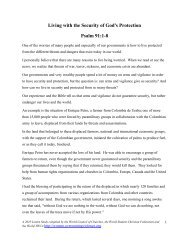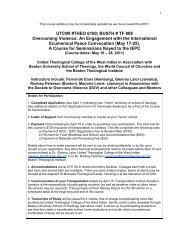Alternative Globalization Addressing Peoples and Earth
Alternative Globalization Addressing Peoples and Earth
Alternative Globalization Addressing Peoples and Earth
Create successful ePaper yourself
Turn your PDF publications into a flip-book with our unique Google optimized e-Paper software.
20<br />
Within the WTO, its member governments from the South:<br />
• have resisted moves to exp<strong>and</strong> the reach of “trade” rules into areas<br />
like investment <strong>and</strong> competition;<br />
• have dem<strong>and</strong>ed the right to revisit rules whose devastating implications<br />
are only now becoming apparent;<br />
• their resistance risks self-defeat if the same objectives are secured<br />
through bilateral <strong>and</strong> regional investment agreements.<br />
Free trade agreements rely on privatization, deregulation <strong>and</strong> liberalization<br />
policies that are central planks of neo-liberal structural adjustment<br />
programmes. Competition now permeates the whole world. Schools <strong>and</strong><br />
universities compete for pupils, culture <strong>and</strong> sports, consumers rival each<br />
other in rampant consumerism, <strong>and</strong> states compete to attract investment<br />
<strong>and</strong> capital. In almost all spheres everywhere, co-operation has been<br />
replaced by competition, the public domain is rolled back <strong>and</strong> transferred<br />
to private, often monopoly <strong>and</strong> transnational corporate control. Problems<br />
are superficially addressed as a lack of finance. This does not address the<br />
root causes of the problems. This dovetails with the United Nations’<br />
Millennium Development Goals (MDGs). Promises to reduce poverty by<br />
half <strong>and</strong> deliver universal education, promote gender equality, provide<br />
access to clean water <strong>and</strong> combat HIV/AIDS by 2015 ring hollow when<br />
they are to be delivered through the commercial market mechanisms that<br />
create the very inequities being addressed.<br />
Nowhere is the bias of the WTO towards major powers <strong>and</strong> transnational<br />
corporations more unreasonable than in the monopolies over life-saving<br />
drugs that it guarantees to pharmaceutical companies. The much-heralded<br />
interpretation of the WTO’s agreement on Trade-Related Intellectual<br />
Property Rights (TRIPS) in relation to health <strong>and</strong> medicines - that was<br />
forced on the EU <strong>and</strong> US by global campaigns <strong>and</strong> resisted by the Brazilian,<br />
South African <strong>and</strong> Indian governments - purports to allow the world’s<br />
poorest countries to import generic drugs. Sadly, this arrangement is so<br />
complex that no government has been able to meet its terms.<br />
The WTO’s treatment of countries seeking to join it makes its claim that<br />
it is a just, rules-based organization totally meaningless. Rules only exist<br />
on behalf of the powerful countries. Because all must agree, each country<br />
has an effective veto over a country joining. In other words, they can<br />
dem<strong>and</strong> unreasonable terms. Vanuatu, for instance, was pressurized to<br />
commit such an expensive list of services, including education, health,<br />
environment, etc., that it decided the price was too high to proceed <strong>and</strong><br />
will only join if it can reopen the package.




